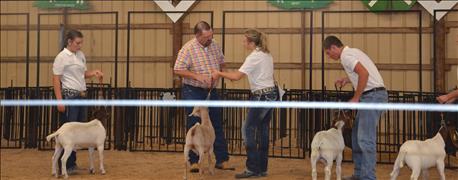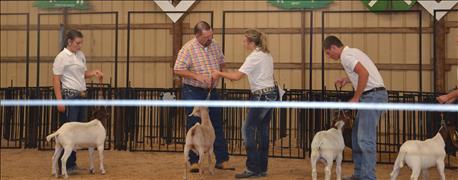
Anyone who shows livestock or who has kids or grandkids showing livestock in 4-H knows that it’s difficult to attend any show, even a county fair show, without hearing about rumors of cheating and animal abuse. The issue bubbled back to the surface again this summer when a significantly higher number of animals at the Indiana State Fair tested positive for drugs than in 2015. In addition, two animals, including the grand champion barrow, were disqualified when it was discovered they were older than rules allow.

COUNTY FAIR SHOWS: Purdue Extension's Jason Henderson says counties can set their own rules as long as they do not involve eligibility for the 4-H program. That is determined by Purdue University Extension.
Does what happens at the Indiana State Fair affect what happens at the county level? Who sets rules for 4-H programs, including who can participate? Is there anything counties can do through rulemaking to curb cheating at the county level?
To get answers to these questions and others, Indiana Prairie Farmer asked Jason Henderson for an exclusive interview. Henderson is the Purdue University Extension director. He is very visible at the Indiana State Fair when it comes to the 4-H program. When rule violations occur at the state fair, Henderson and Doug Huntsinger, executive producer of the Indiana State Fair, deal with the consequences. (IPF talked with Huntsinger earlier this week.)
IPF: If a 4-H’er is disqualified at the Indiana State Fair because of a rules violation or a drugged animal, does that affect his or her status at the county level?
Henderson: If an infraction occurs at the state level, such as at the state fair, it is dealt with at the state level. Nothing changes at the county level because of the infraction at the state level.
IPF: Who determines 4-H eligibility at the county level?
Henderson: 4-H eligibility is a Purdue [Extension] decision.
IPF: Can county 4-H councils make rules regarding the 4-H program in the county?
Henderson: Many counties have 4-H councils made up of active volunteers. A 4-H council can make its own rules for the county 4-H program. For example, if the 4-H council in a county decides that it wants animals to be rough-sheared for show, it can do that.
However, if it pertains to whether a child is eligible to participate in 4-H, it is a Purdue [Extension] decision. If a county 4-H council establishes a rule, they must be able to enforce that rule if someone violates it.
IPF: Is cheating in livestock shows a concern?
Henderson: Yes. We look at the big picture. We have a handful of people out of thousands of animals and people competing at the state fair each year who are caught violating rules. It’s a case where the 1% affect the situation for everyone else. It’s important because if drugs are used illegally, it affects the security of the food chain.
IPF: Are there situations where counties could take action if someone misbehaves?
Henderson: Suppose someone shows up drunk at a livestock show at the county fair. It’s county property. Naturally, county authorities have the right to remove that person. It’s just an example which illustrates what counties can do.
IPF: What if someone in the 4-H program falsifies information, such as on an entry form?
Henderson: If someone falsified information, then they will be disqualified.
IPF: What is the bottom line for the relationship between Purdue Extension and county 4-H programs?
Henderson: We would hope 4-H councils in counties would make sound rules and work in partnership with Purdue Extension. Counties must realize that rules which they make must be in compliance with eligibility rules [set by Purdue].
IPF: How do you view the value of livestock projects as part of the 4-H program?
Henderson: I could not envision livestock shows not being a big part of the Indiana 4-H program. These projects allow us to teach youth various important skills. Taking care of an animal takes a certain amount of dedication. These are qualities that we want to instill in young people. At the same time, we want to expose youth to the world of high-tech. That’s where new projects like robotics come into play. Youth today are going to need these skills as well to be successful in agriculture in the future.
About the Author(s)
You May Also Like




